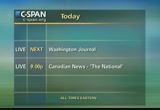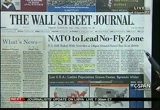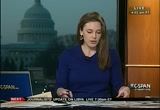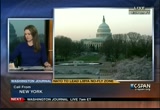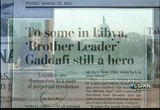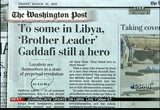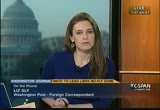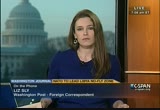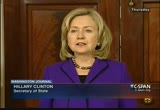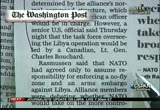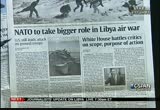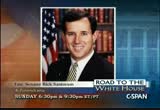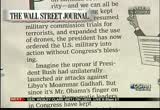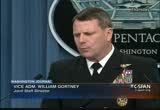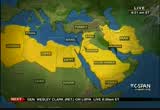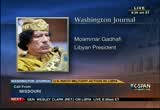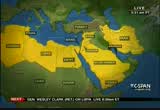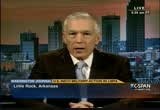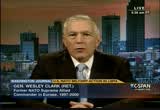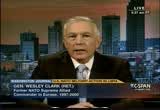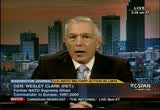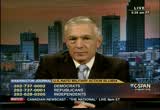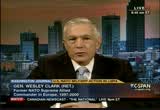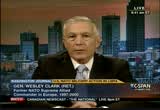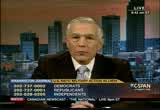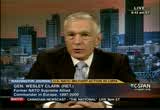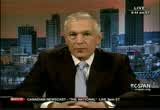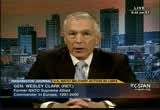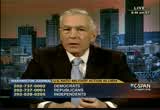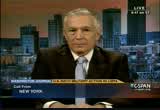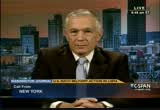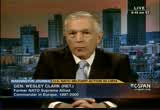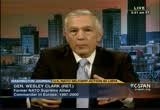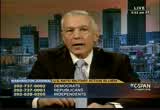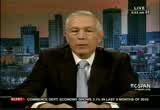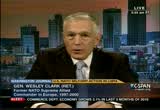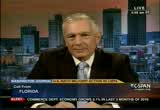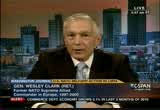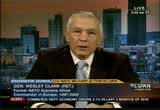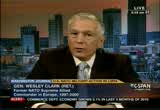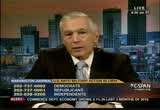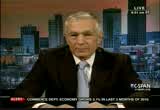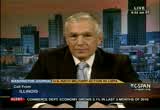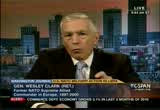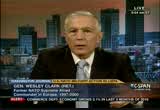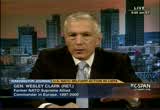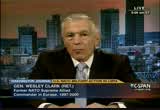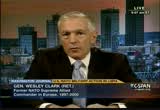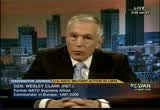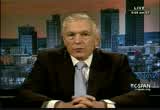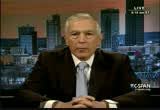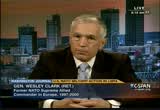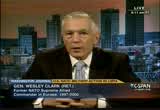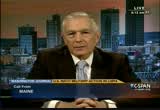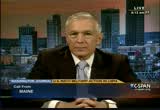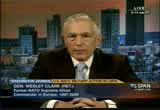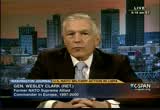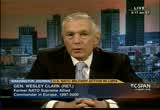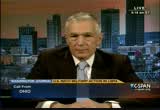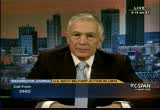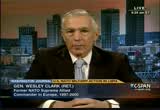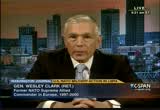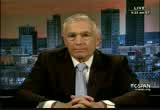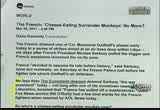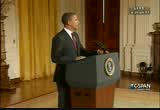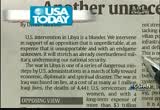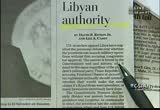tv Washington Journal CSPAN March 25, 2011 7:00am-10:00am EDT
7:00 am
>> in about a half-hour, we will focus on the military situation in libya. our guests are meghan stolen from the national journey, -- "national journal" and ms. c ryan. and the retired general wesley clark. "washington journal" is next. host: an image of the white house where president barack obama is today, recently back from his trip to latin america. a lot of focus right now on the president's decision in libya and what role the u.s. has welcome to "washington journal" this friday, march 25. in "the baltimore sun," -- nato to take the lead. what do you think about the nato and u.s. role in libya? the numbers to call --
7:02 am
7:03 am
let's get to the phones and hear what you think. lydia in maryland. democrats' line. caller: i think it is great he is turning over command of the no-fly zone to nato. he said the united states would not be in the lead and it is about time it takes responsibility. more of the gulf states are contributing airplanes to the no-fly zone. i saw last night that night thatqatar, united arab emirates, contributing planes to the no- fly zone. that is great. they can do that. since the united states does not taking the lead and attacking another muslim country. host: janet in new york on the independent line. good morning. caller: i would like to say that i am glad that our president terminated any action.
7:04 am
i am glad that he put the secretary of state out there. what i don't understand is, a few months ago libya was held up as an ideal example for iran to follow. then england and scotland released a prisoner to lybia. from then on, libya became the bad boy that had to go. and our secretary of state, of course, was leading that fight. understand. libya last year was an example. i remember when libya had to
7:05 am
import workers -- when gaddafi took over in libya, he shared the wealth. he was an example -- they had to import workers to come over and work because he made just about everybody rich. host: let us look at 8 piece 48 -- from a correspondent from "the washington post." should talk about how his portrait hangs from lampposts. showing to all outward appearances the city is deeply enamored of gaddafi. but she writes --
7:06 am
let's go to the phone and hear from liz sly from "the washington post" who joins us from tripoli. hi, there. thank you for taking time to talk to us. what are you hearing from the people of tripoli, their response both to gaddafi and what is happening now? guest: a lot of people are noisily on showing their support for gaddafi, and it is not very hard to find people who will jump up and down and chant slogans in support of him. showing they are angry with this. but if you walk in the streets and you fall into conversations with people in private, there are really quite a lot of people out there who are not happy with this. one said thank you to your government. it is really hard to tell, but i would say that quite a lot of
7:07 am
the people here are open the bombing campaign managers to get an out of power. >> -- host: how much fear is there for personal safety? guest: right now a house on the outskirts of tripoli was hit by a bomb last night. it seemed to be a small missile and a girl was injured and there is damage to the civilian house. the first damage we have seen to a civilian targets since the bombing campaign started. the government repeatedly told us there is such damage, civilians are being hit, but they have not managed to show us that before. we do have a bomb that landed in a garden in a civilian home. we have not seen any evidence until now of any civilian targets being hit or any civilian casualties. host: liz sly is joining us from tripoli right now. what is the level of awareness there about the involvement of
7:08 am
nato right now versus the u.s.? how are people interpreting the leadership of what is happening over the skies? guest: i don't think there is a clear understanding of what is going on. libyan state television, anti- western propaganda. other people do watch other channels but they don't follow the ins and outs. one of my concerns is that the people who want gaddafi gone are pinning too much hope on this mission, and they are expecting it to go further than it actually will. host: is there a mood about ground troops? did they feel it would be more helpful to the rebel movement? are they concerned? guest: people are not really talking about that. it may be an issue in the east where the rebels are fighting. here you have a city that is firmly in control of the government. people are even scared to voice
7:09 am
their opinions in public, let alone fighting. that is not something really being discussed. yes, i do think there are people who would like gaddafi gone at all costs, what ever it took. certainly, some of those people might welcome ground troops. host: how are people able to access information? guest: the internet has been cut off for about three weeks now. satellite channels are available, but not everybody has dishes. not everybody has access. i know with one family, interrogated for hours by the police because they will -- were caught watching al-arabiya station. it is not clear whether people have clear information about what is going on here. host: what are you watching for in the next couple of hours? you mentioned that you just saw house that libyan authorities
7:10 am
say was hit. will that change the dynamic play right now? guest: no, not really. one of the biggest things we are interested to know -- excuse me -- is whether or not there is going to be -- whether a not protest will start happening here again. now interested to see -- as the nato mission does its work, whether people will take a cue from that and rise up again. host: liz sly from "the washington post." thank you for taken the time to talk with us. we will be speaking about libya for the entire "washington journal" this morning. we will talk to reporters covering it and retired general wesley clark and she was led clark and members from congress on how they are waiting and on president obama's decision. what do using about the
7:11 am
announcement that nato will lead the effort over libya and the no-fly zone? it is not clear cut, though. the u.s. testing involved and the u.s. is being dependent depended on specifically for operations. let us hear from sammy on the republican line from jacksonville, florida. caller: good morning. thanks for taking my call. i don't think obama knows exactly what he wants. first, he said gaddafi has to go then he goes back and says, well, i don't think -- maybe he should stay. and then he comes back -- a couple of times he would say, he has to go. we've got to get rid of him. then he comes back and says, well, i don't know so, he is just flailing around any don't know what he wants. all of these other democrats calling in now saying he is doing a good job, they approve
7:12 am
of him -- they are a bunch of hypocrites. sorry, i got your name mixed up. look at the way they did when bush went in iraq -- host: did you support -- caller: they were outraged. now everything is so good and they approved. we are broke -- the money that was spent -- a million dollars apiece -- host: did you support the effort in iraq when president bush did -- when president bush announced that? caller: no, i sure didn't. host: michael on the democrats'
7:13 am
line. caller: i just want to say it religion not matter whether you are a republican, democrat, or id pay -- it really should not matter. this is a time we should stand behind the president and his decision to send troops to libya. gaddafi is a dictator who killed many of his people. i am glad president obama has heard the libyan people's cried. we need the united states. we have experience with the war. the best experience the military. i am glad obama has gone over there to help the people. i sit here in a small town in northern maine and i watched the news and i see these people being slaughtered and as an american i can say i am proud of our present stepping up. it just shows he is a leader. host: let us take a listen to secretary -- thomas secretary of state hillary clinton made yesterday.
7:14 am
>> from a star, president obama has stressed the role of the u.n. does military will be limited in time and scope. our mission has been to use america's unique capabilities to create the conditions for the no-fly zone and to assist in meeting urgent humanitarian needs. and as expected, we are already seeing a significant reduction in a number of u.s. airplanes involved in operations as the number of airplanes from other countries increase in number. today we are taking the next step. we have agreed, along with our nato allies, to transition command-and-control for the no- fly zone over libya to nato. host: secretary of state hillary clinton speaking yesterday. let us look at "the washington post" clarifying their role as much as one can right now. nato versus the u.s. in libya.
7:15 am
7:16 am
it is another one -- there are so many endless wars, you know? where it is easy and simple for the guys in high power to decide to do with the money we give out as taxes. instead of using it for good health care for us, for the people of america, good education. just imagine how different things would be if we had a good health for people, not having to pay for its, how much other governments would like to be like us instead of fighting these endless wars just to benefit if a few companies and a few people. ok? thank you very much for letting me talk. host: one of the other callers mentioned the cost of the war. i used the word were only because what one did.
7:17 am
that is not necessarily go word of the white house views -- talk about a no-fly effort without troops on the ground the cost of the limited no-fly zone effort. $3 billion after six months. $400 million to $800 million for eliminating ground targets. $30 million to $100 million per week over all. from the center of strategic and budgetary assessment. "usa today" talk about this -- as nato takes a bigger role in libya air war. about a recent decision that nato will take responsibility for part of the air war in libya from the u.s. on a day when allied warplanes pounded the ground forces of libyan leader gaddafi.
7:18 am
missouri. sharon is calling in on the republican line. good morning. caller: good morning, hi. i just wanted to make a few comments on what has been happening. for one thing, president obama just stated last week we would only be in there for a few days. now we are in there for the long haul. we don't have the money to be supporting libya. and we don't have to worry about the oil coming out of libya. i would like to know why we are shipping our alaska oil overseas.
7:19 am
the american people paid for that pipeline. we have enough oil. and all of the cuts they are making in the white house, they don't consider the poor people. they are cutting a lot of the programs for the poor and that is not right. i am one -- one of the poor, and i have to live on a budgeted income. all of these white people up there in the white house, they need to live on a budget income also. let them reduce their salaries, and that would save americans a whole lot of money. host: let's take a look at some other stories in the news right now. "usa today" gives us a roundup elsewhere. in bahrain --
7:20 am
in yemen, the youth groups leading and up riders -- uprising calling for the president's ouster and what a new constitution and dissolution of the parliament, local councils, and the secret agencies. in japan, the latest from the ap says japanese nuclear safety officials say they suspect the reactor core at one unit of the troubled fukushima nuclear power plant may have breached. "usa today" goes with this story. it profiles what is happening at the plant and says japan workers risk lives to try to control the radiation. another story related to japan
7:21 am
-- fears rise about selling off of u.s. debt. rising concern that demand for capital by japan may lead it to sell off huge holdings -- speaking of what is happening in washington and politics in general, we have some stories related to that. john boehner facing tea party pressure, reports "the wall street journal." on state tea party activists have access to speaker john boehner, more than any lobbyist would envy. they meet twice a month and their e-mails are answered quickly. but that does not seem to be enough to turn them into loyalists. all i of conservatives are preparing to call 1000 of mr. boehner's donors betty is not doing enough to block the debt limit increase.
7:22 am
you've probably heard this news yesterday. michelle bachmann, congresswoman from minnesota, it is closer to decide whether to run for the white house. getting this story from "the washington times." she is feeling the pressure to rush a decision on the white house bid and it may announce intentions as early as may, one ever talked advisers said thursday. she says i want to be part of the conversation and making sure president obama serbs one term, not two. taking a look at some of the other stories going on in the news. the pentagon stopped work on the f-35's second engine. unilateral as the budget is in limbo. let's go to grosse pointe, michigan, where tom is on our democrats' line. he is calling about our topic, nadal's roll over the libyan skies. also what the u.s. is doing. what do you think?
7:23 am
caller: this story has been in the newspapers and the media for so long -- almost three months is too long -- four people really to be informed about what is happening not just their but what should be happening there, according to what other countries are doing. it is really a historical question americans have a convenient memory sometimes when it comes to make tough political decisions. they forget about history -- the american revolution and how the french basically helped us win the war by breaking the british blockade. then you look at the civil war. the question in libya is, do they deserve to have a civil war with a dictator. americans making these decisions about no-fly zones and getting air time just for our opinions, especially on c-span -- there are other media outlets that let
7:24 am
people get their opinions out. you know, and then just this week -- and you have to read the newspapers -- it was reported -- and i knew this back when the first thing happens in libya. gaddafi admitted he was responsible for the lockerbie scotland -- planting the bomb on the airplane. he got let out of jail -- the terrorists, that is. that was an act by scottish parliament, i believe. what are the british brewing letting him out of jail? what is the outcome of him getting back into libyan soil, walking off of the plane to cheers from the crowd. this guy that killed dozens of people on an airplane. how do we make these decisions? so many things to consider. do i support the no-fly zone? sure. do i think it could have been
7:25 am
done without america's help? sure. then you question the french. look at their historical connection to america. i just explained it. host: all right. let's go to jelly on the republican line. caller: how are you doing? i've got a couple of points. i am a veteran. i fought in iraq. you have to look at some points. first of all, up under the clinton regime, what happens in cause of all -- what happened in kosovo, that was no involvement, and then some malia, nato with u.s. involvement, and what happened there? a bunch of the rangers got killed and we could not do nothing about it. and now we are going to fall up under nato with the president putting itself under the power of nato. what is going to happen here?
7:26 am
i do not think we should fall under nato. if we are going to be the super power, we should take control. we've got people on the left saying, the president is doing the right thing, doing the right thing. what happened when president bush went into iraq, all of these people on the left were saying, we should not be in iraq, which cannot be in iraq. and president obama doing this, he is doing the right thing. people speak with two sides of their face -- when it is a democrat, it is a good thing, but a republican, it is a bad thing. i think people need to look at the situation and look at reality. host: let's go to jim in florida. good morning. turn down your tv. you are with us. you are on the air.
7:27 am
caller: great, great. of the libyan thing, i think we have to do something to lower the playing field. you have planes and rockets, you got to take them away from them. i do not care who's got them. if they use them on their own people, to destroy their own people just because their own dibble wants a different form of government, you have to level the playing field. i think obama did the only thing he could do. he could have done it and little sooner, but who knows, the french went in first. i'd like to see that. it is about time the french -- but they have not taken a lead role like they did -- with a gaddafi's troops and weapons. it had to be done. it had to be done. all of these people who want to be free in libya -- they would have been annihilated if they had not done something when they
7:28 am
did it. a little late, but they did it in the nick of time. they kept the people from getting annihilated. they said no one was killed in benghazi yet and there was a bomb dropped in some ladies courtyard but other than that, no deaths in benghazi. host: from twitter -- giving us his opinion about what he thinks of the nato efforts over libya, and what the u.s. is still going there. let's go to sterling, virginia. gary, republican caller. caller: first i wanted to say something about radiation and the nuclear reactor in japan. because radiation is a function of high voltage and frequency, i wonder if opposite an equal amplitude and frequency could
7:29 am
not de-radiate of the radiation. and because the radiation and taxed the cell walls of cells, and vitamins c strengthens cell walls against radiation, it might be helpful for people to take vitamin c. host: ok, what do you think about libya? guest: i think it is completely different than of foreign-policy president bush had, when we went into afghanistan and just gave it a lick and a promise, and then we went into iraq and did a half mast job of their, which cost us 4000 lives and 4000 men and women who are in wheeled chairs. but the other thing i would like to say is the architect of nafta
7:30 am
was the chamber of commerce. it was not president clinton. people blame president clinton when it was the united states chamber of commerce who bamboozled clinton into doing nafta. one other thing -- host: let us leave it there so we can get other folks to call. a call from pr. good morning. caller: a country named after you. host: not quite, but close. caller: human rights -- libya 101. does not matter if the u.s., nato, canada, of france. france alone could take out gaddafi of mentally. one country can. he does not really have any power. it does not matter if it is nato, u.s., whether is in charge.
7:31 am
human life -- what does that cost? gaddafi is sensing weakness. this man is an enemy of humanity unless he is removed. this man, with his money and ruthlessness, he will be coming back with a vengeance killing people in europe and the u.s. everywhere. we are getting a lot of insight news, by the way. this funeral that he did our bodies he borrowed from people he killed. completely fake just to get sympathy from the media. his sympathizers, by the way, mostly from outside. not even libya. they are getting pete -- paid without doing anything. the other question -- because i know a lot.
7:32 am
this could turn out to be bosnia. if he is gone -- it could be another bosnia. we shall level the playing field, just like the fellow from florida said. the rebels, -- otherwise, he could get all the weapons he can and he can outlast. host: would go on to one more call right now. staten island, new york. calf wind -- katherine joins us on the independent line. caller: i don't understand. everybody -- president obama did write -- right to go into lebanon and gaddafi is a terrorist or what ever he is. i don't see any killing. they are talking. they keep saying -- a lot of people. how many question -- how many?
7:33 am
and one thing that bothers me them most. the budget, they have no money to stop this country from going down the drain and they are still spending money. our president went to brazil to give $2 billion for the president there to drill for oil. why not doing that here? all right? that is my point. thank you. host: looking at a couple of other news stories right now. controller fatigue a continuing concern. looking at what happened to the air traffic controller who allegedly zealously but the job at a reagan national airport in washington, d.c., area.
7:34 am
also, looking at some more stories in the news. the census numbers. latino population grows faster and spreads wider, "the wall street journal" story. and in the "the washington post" people in this area reading black majority status slipped away in the washington, d.c., area. if you were blacks and the district. the district continued to lose african-american residents over the past 20 years. we will keep talking about libya this morning. we will be right back in just a moment with two journalists who can give us some perspective on what is happening in libya right now. later on we will talk to retired general wesley clark as well. we will be right back. [captioning performed by national captioning institute]
7:35 am
[captions copyright national cable satellite corp. 2011] >> live saturday, potential gop presidential candidates in the morning, i would, at the conservative principles conference. and on "road to the white house" sunday, our interview with rick santorum of. on c-span. >> i am a numbers guy. >> as the visual op-ed columnist for "the new york times" he expresses opinions using charts and graphs. >> to me, the data comes first. i did not decide i will talk about a subject and then look for data. i really do search for data first and if it says something interesting and some been that kind of agrees with an opinion that i have, or if it is
7:36 am
something that surprises me or surprises my readers -- >> "q&a" sunday night at 8:00 on c-span. >> throughout april, we will feature the top winners of this year's c-span studentcam competition. nearly 1500 middle and high school students submitted documentaries on "washington, d.c., from my lens." watch every morning at 6:50 a.m. eastern just before "washington journal." and meet the students that created them. a stream of all of the videos any time on line at studentcam.org. >> this weekend on of book tv on c-span2, "the washington post" -- leads a discussion on john hinckley, jr.'s, failed associate -- assassination attempt on president reagan. and throughout the weekend, from the virginia festival on the book, panels on science, the
7:37 am
vietnam war, founded fathers and religion, and more. to have this e-mails -- then e- mail directly, sign up for a book tv alert. "washington journal" continues. host: megan scully is with "national journal" and we have missy ryan -- pentagon reporter. how significant is it that nato will step up and take the lead? guest: it is an important step but not everything the obama administration wanted. what they have done it is often rise nato countries to enforce the no-fly zone but that is only the first part of the u.n. security council resolution. what the nato countries did not do is authorize the full mandate, which is all necessary means required to protect civilians. host: how is the obama administration reacting?
7:38 am
guest: they are saying it is a significant step forward, but they are hoping that maybe some day next week when clinton meets with other foreign ministers in london, that the other countries will, but -- come around. a lot depends on events on the ground. host: night and, you did a story about the cost. a recent story -- five days into the operation, of costa mounting. it could cause billions and could require the pentagon to request emergency funding from congress did it take us through the cost. guest: bay already spends hundreds -- they already spent hundreds of millions of dollars. then you throw in the f-15 fighter that crashed down, replacing it with a more advanced fighter, which is what they typically do, over $100 million. it does not include fuel costs or combat pay. the total cost for the operation
7:39 am
is too hard to tell at this point. there are too many variables, such as the extent to which nato is going to take the lead and how long air strikes will continue and how central the united states will continue to being in patrolling and also striking. we will see probably in the next few weeks. the white house says it does not plan to request supplemental funding but some skeptics say money is already tight. more than a billion dollars, they will need some sort of emergency funding. host: talking about libya, the u.s. role and nato policy role. our guests are megan scully and missy ryan. you can join the conversation -- we are spending all of "washington journal" today focused on libya. missy ryan, a colleague at reuters reported on what is going on.
7:40 am
saying it seems less likely the u.s. will be able to quickly handoff control to another nation until coalition forces can successfully disabled gaddafi's forces and ground forces and that pilots can safely enforce the no-fly zone. guest: part of the problem the administration is facing right now, it is they have had some tactical successes -- they have been able to disable gaddafi's air force and and has struck ground forces. but the ultimate stated goal at this point is to protect civilians. but gaddafi is still going after civilians in cities. at this stage, there is fierce debate going on within the pentagon and administration generally how far the united states is willing to go to do that. obama said he is not willing to put boots on the ground, but how much does air superiority really accomplish? host: where does this leave you as you report on this?
7:41 am
guest: looking for signs that other countries within the nato alliance and other countries participating would support greater action and perhaps continued ground strikes. i don't think there is an appetite anywhere for sending in troops. as i think that is something that is really first and foremost in the mind of the decision makers at the pentagon making their recommendations to the president. host: megan scully, the difference between air strikes and boots on the ground, how is that playing out in washington? guest: with troops deployed to iraq and afghanistan, afghanistan for nearly a decade, it would be a hard sell to send troops on the ground. the military is already very thinly stretched. hard enough for obama to build a consensus on capitol hill in either party around the air strikes. the ground up forces alone would
7:42 am
be very difficult. it would be much more expensive. and there would be concerns of losses of u.s. life. host: let's get to the funds. mike and joins us from oregon on the democrats' line. caller: thank you for c-span. and i there? hello? yes. ok. the reason i am calling is i was irritated from these phone calls -- ok, the guy from florida and the other one from texas or what ever -- whatever. you cannot compare apples to oranges. what bush did in iraq to what the president is doing now, there is no comparison. we are talking about saving people's lives who are being brutally -- basically murdered by this idiots. i spent some 14 years in europe, and gaddafi -- you'd
7:43 am
hear -- heard quite a bit more from -- about him with lockerbie. i think we are doing the right thing. i support the president in what he is doing. i am sure nato would take this over. sarkozy is the one kind of behind this and i think it is the best thing to get rid of this guy, period. that is my opinion. host: reaction? guest: i think obama has said that gaddafi has to go and clearly the united states is interested in having a leader in libya who is not going to attack his own evil. that -- his own people. that said, the united states is incredibly leery of getting involved in another conflict that has no clear end, in which we do not have a clear exit strategy. and you have to remember that president obama really made his name on a national level through his opposition to the iraq war. and when he came into
7:44 am
afghanistan, although he surged 30,000 troops, he made it very clear he hopes to end the combat role and presumably allow the military sometimes to recover and regroup and think about the next war. guest: i think there is some concern, too, among those who are opposed, that there is no exit strategy. that this is sort of being done on the fly. on capitol hill, they are worried about the fact they have not wait and publicly. there was no authorization for the use of force. and they wanted to have that opportunity. the administration will be briefing lawmakers next week. that might quell some of the concerns. but i think the long term concerns about how long we are going to be there and what the ultimate goal is are going to linger for some time. host: "the wall street journal"
7:45 am
as an opinion piece from the law professor at berkeley who was a justice department official back during the george w. bush administration. he writes that -- host: megan, how you expect this to play out? members of congress are on a recess but they still are engaged. how speaker boehner sent a letter bringing up two concerns
7:46 am
about the president not consulting congress. what are you hearing right now? guest: one of the most interesting things we are seeing is a senator lugar, who is a republican, top republican on the senate foreign relations committee, he has pretty much been in step with obama on most foreign policy issues and he was one of the first to come out opposing obama going into libya without consulting congress, without seeking authorization for the use of force. if senator lugar is going to break with the administration, it will be hard for the administration to find any republicans to support the operation in libya. you also see some concerns from members of obama's own party. senator begich put out a statement last week talking about worries about cost and wanting more information. as i said, there is no
7:47 am
consensus. there are members who are very supportive of the president. armed services chairman carl levin and other key democrats have been very vocal in their support. but it will be an interesting week next week. host: other members of the democratic party include congressman chris new hampshire, who is against it -- congressman kucinich, who is against it. guest: i think one thing to remember is really there were not any good options for obama in this whole libya situation. as we saw quite clearly, defense secretary robert gates came out at congress a few weeks ago and expressed deep concerns about the prospect of getting involved at all in libya, regarding the financial cost and potential human costs, even enforcing a no-fly zone. i think those concerns were also shared within the white house.
7:48 am
on the other hand, a bomb or really, i don't think, wanted to be seen as standing by judy obama really, i don't think, want to be seen standing by as something like mass slaughter to happen. i think there are influential people and the administration, like susan rice, who really thought there was a moral responsibility from the united states to take action. host: let's go to montana where henry is on our independent line. good morning. go right ahead. caller: my question is -- do you know who is the current nato commander? the united states navy admiral. that means the united states navy is in charge. and this president has violated the constitution and should be impeached. he stepped on it time after time after time. president bush even approached congress and got permission for war. and this president has not done so.
7:49 am
briefing members of congress is not getting permission, not getting a vote. guest: i think -- you mentioned congressman kucinich, certainly shares your views in terms of concerns. there are many who want to see this authorization for the use of the first pick -- force. however, the administration said, often many people in capitol hill and throughout government who wanted to see the administration move faster on libya. now that are saying, wait, we should have gone slower and consulted with congress. it seems as though the president's strategy here did not appease anyone on either side of the spectrum. it will be, as i said, insisting to see how it plays out next week and if there is a middle ground. >> let's take a look at the war powers resolution in 1973. the president can send combat troops to battle for 60 days
7:50 am
without a declaration of war by congress or a specific congressional mandate and the president can extend the time for 30 extra days without congressional approval for a total of 90 days. missy ryan, what power does it give president obama at the moment? actual versus political power? guest: from a legal perspective, that is of the crux of the debate and it seems to me not being a legal expert there is a gray area here. possibly obama was sort of her pink -- hoping congress would fall into line. he didn't need to act quickly. there was a feeling, i think, within the white house that after dragging out the decision for several weeks, the united states, when it started pushing for the u.n. security council resolution, that it needed to act within days an order to avert a total defeat of the rebel forces.
7:51 am
i think obama may be expo's facto is going to live to deal with the congressional side of things. host: we have missy ryan with the warriors, and megan scully from "national journal." a caller from the republicans line. caller: i was talking to my wife and a pool of the other day, and there was a lot of discussion going out within days -- getting out of the war or this conflict quickly. i think that is a mistake. just like my wife was in the pool, she heeded the poll, and i said we just do -- you just have to get in. we spend the money to do it. we spent the time in libya. we were the first been. i think we need to get the objective done. the president said gaddafi
7:52 am
definitely needs to be taken out of power. and i think, why would we leave without completing the objective? it would be even worse if we need to get back into this thing -- don't you agree? guest: i think that what obama is willing to do to protect civilians in libya, and perhaps to seek adopt ago, is really unclear at this point. part of a fine line the obama administration is walking is the fact that there are serious differences in interpretations among nato countries and arab countries about what it is exactly the u.n. is a dirty council actually authorized. all necessary members he -- measures. does it include a ousting gaddafi? it seems to me the ideal scenario from the american perspective would be that we enforce a no-fly zone, we
7:53 am
conduct targeted strikes on military assets and on gaddafi's ground forces, but then there is an ability from the rebels, which we have not seen yet, to sort of coalesce and actively oust gaddafi themselves. host: there has been a question about what the mission is, what the goal is. are you seeing a difference between nato bicycles and the u.s. possible? guest: i do not even known that there is a necessary single unified message within nato. or within the united states. obama has made it clear he wants gaddafi to go. meanwhile, the pentagon this week has driven home of one said that their mission is to protect civilians. that gaddafi itself is not necessarily a goal. while they do not want to see him continue in office, their objective is to protect the civilians and not to work with
7:54 am
the rebels and not to necessarily target gaddafi or anyone specifically. host: let us look at statements from a pentagon briefing last night. >> our guidance is very clear. we are going to give up the command commission, as we said from the very beginning. give up the command positions and the participants in that process but not in command. and then we will continue to provide predominantly those capabilities that we have that are unique and enable operations, as well as additional capacity the coalition may not have that we do bring to the fight. an example would be tankers, some of our isr platforms. and i would anticipate that we would continue to provide interdiction strike packages as well should that be needed by
7:55 am
the coalition. host: the vice admiral speaking at a pentagon briefing. let us look at a comment on twitter -- are ground troops even an option? guest: know, the president said very clearly it is not an option -- no, the president said very clearly it is not an option. guest: it is not even a option at this point. host: could nato move on that? guest: i suppose they certainly could but i do not think that what happened. i do not think you see an appetite for that even among the nato members who have taken the most aggressive posture in this debate. france definitely has been spearheading this whole thing. they were the first to conduct any sort of military action less than a week ago, and the first to recognize the rebels governing council. but i do not think there is talk
7:56 am
of that. host: bethlehem, pennsylvania. ron is on our democrats' line. caller: good morning. my question is, i have not heard anyone really talking about doing the iraq war -- the weapons of mass destruction was a big problem with nato and how we did go in and invade, really without data's approval, because of the weapons that we were looking for -- you know, we didn't find them. now that we are kind of working more closely with nato and our our luck -- our allies, france and britain and other countries, what did they help pay for some of this now? guest: certainly, there is the idea there would be a shared cost. and i think that really what the obama administration is hoping to achieve within days -- we
7:57 am
have already seen this sort of first stage in nato agreement. but ideally what they hope is there would be a consensus around a nato command and control structure that would include nato members, plus several other countries like qatar and united arab emirates, conducting the no fly patrols and other military activities. they already sent a number of ships. and they have planes. turkey is sending a tanker, i believe. france has an aircraft carrier. certainly it is likely the pentagon will continue to pay for the lion's share of the entire operation, because we have the most sickening -- sophisticated technology. we have surveillance and logistics capabilities that other countries do not have dared but i think really what is the most important thing for the pentagon at this point is to
7:58 am
ensure they are not seen as running the show. whereas, in afghanistan and iraq, coalition forces -- the fact of, it was u.s.-led and primarily u.s. military campaigns. guest: i think certainly in terms of the shared costs, one of the things the pentagon has driven home this week is the number of sorties being flown by the u.s. versus the coalition, and every day they say it is getting even more equalized and the coalition now or soon will be flying more sorties than the united states. that being said, as you just heard the admiral saying, the united states will continue to supply refueling tanker capabilities, command and control, intelligence, surveillance, and were conscience and also interdiction strike packages.
7:59 am
so it looks like the united states for now will continue to be very involved. but as missy said, the perception issue, we do not want to appear to be in any way the lead for any extended period of time. host: let us hear from chop from alaska. the very -- good early morning to you. caller: i would like to ask these journalists on your show, what specific public office does gaddafi hold from which he has to leave? nato, is of the supreme command in the united states, so the united states would still be leading the intervention in libya since it commands nato? 3, what is a civilian and libya? somebody would pick up a 50- caliber machine guns stolen from a government armory to shoot
8:00 am
other civilians to support gaddafi? are they civilians? guest: to address your last point, what is a civilian in libya, that is one thing the military said it is hard to determine who is a civilian and who is not. it is tee tee not cut and dried. -- it is not cut and dried. people have taken up arms to protect their businesses and their homes. they are considered civilians. guest: that is a point of debate among not just the american commanders but the other coalition commanders. how we figure out who is on the side we want to be targeting other than the guys who are in
8:01 am
the uniform. there has not been any libyan rebel-on libyan civilian violence. that could happen in the future. we're doing from a cautionary perspective is avoiding conducting any strikes on gaddafi forces within cities. we do not want to accidentally killed civilians. host: let's go to the phone where, spent roscoe bartlett joins us, republican from maryland. what is your impression over what is happening in libya? guest: my concern is more about how we got there. the president tuesday that we are going to do this. he did not tell us until friday, a few minutes before planes started flying there. the congress declares war.
8:02 am
the constitution is explicit on that. the only responsibility of the president is commander in chief. i think that a whole series of presidents have violated the constitution beginning with jack kennedy and the bay of pigs. congress through the years have relinquish more of its constitutional authorities to the courts and to the executive. this is not the king's army. the president cannot commit our military forces any time he wishes any work he wishes. this is a clear violation of the constitution. if you can ignore or violate the constitution for a good cause, then you can ignore or violate it for a bad cause. we are a great, free country.
8:03 am
we have the enormous respect for civil liberties. no other constitution or bill of rights that gives such protection. i think we put at risk -- this has established a climate where creativity can flourish. that is one of the things -- the only economic and military superpower in the world and we put a risk of who we are. i am concerned that we do not just ignore the constitution or violate the constitution. i am more concerned about how we got there. we cannot pay for this. we have no money. my 10 kids and 17 grandkids are going to pay for this. we needed to ask them. we are accumulating more and more debt for future
8:04 am
generations. there was never a chance for the american people to weigh in. we need a long debate in congress. we could have debated this on tuesday. host: congress has been on recess. guest: we did not need to come back. the president on tuesday he was going to do this. it was worth coming back for. a one-day debate is a long debate in the congress. we could have had that debate on tuesday or wednesday. we were there. we could have stayed later. host: let's get some questions. we're speaking with roscoe bartlett, the chairman of the armed services committee. guest: what would the president need to do it at this stage to make amends?
8:05 am
what can he do to satisfy those in congress who feel that they were snubbed? guest: it is not a matter of being snubbed. the president needs to come back and tell the congress he is sorry, we will not do that again. the issue is pretty moot. we are already there. host: we have megan scully with "national journal." guest: there have been several proposals on how to address this issue when congress returns. what do you think is the most likely means by which congress will weigh and in? -- will weigh in? perhaps involving funding. guest: i know there are proposals to deny funding for
8:06 am
this. i do not think that will happen. we stand behind the commitment. we will support our troops. there is a lot at risk over there. we should have had this debate. my concern is not much that we're there. my concern is how we got there. we need to make sure this will not happen again. presidents ignore the constitution. they think that the war powers act is unconstitutional. the war powers act is all -- is very clear. it is a recapitulation of the constitution. it says the president can commit our troops if there is specific legislative authority, short of declaring war. and if we are under imminent attack. none of those apply here.
8:07 am
he cannot commit the troops. we needed to have that debate. host: to you support it -- do you support it? guest: i hate to see people slaughtered. the future of our kids needs to be considered. we don't have any money. our deficit is now $200 billion more than our total discretionary spending. we need to have a debate in the congress. host: do you support it? guest: we did not have that debate. we have not heard all those facts in the debate. i suspect the american people would have decided the money is important but saving lives is even more important. but we did not have that debate.
8:08 am
the president just committed to troops. he knew on tuesday -- he did not tell us until friday, the day after we started on the work break. host: congressman roscoe bartlett, chairman of the armed services subcommittee. thank you for joining us. megan scully and mrs. ryan from responders -- and nancy ryan -- missy ryan from reuters. caller: there is a lot of criticism coming from the right about the president's moves. some may say the right wing's loves military action when they think it is called for. it is not necessarily something to be measured against what past
8:09 am
presidents have done. it is something that should be measured against the president's own words in the past. not that we should pay attention to anything joe biden says. he opens his mouth to change feet. he loves to take potshots at george bush he has done something that is unilateral. he did not go to congress. he built a coalition and the calls iraq unilateral. it took many months to try to resolve it without military action. he is contradicting himself as he often does. for a man who says let me be clear, i think his message is very mixed on this. he should be in the country.
8:10 am
guest: you mention the unilateral action. not speaking to congress is a concern. president felt a need to move forward. there was a coalition forming to kind of sidestep congress and go right to the u.n. security council and get this ball rolling as quickly as possible once he made the decision. the goal here, unlike in iraq or other countries, is to get the united states out from the get go and to put a different face on the different country in the forefront. we're providing more of a support role. probably a rather hefty support role. but a support role nonetheless. guest: one of the interesting things that might come of the libya situation is that the
8:11 am
viability of what is being called the obama doctrine, which would be a more authentic international military effort involving sanctions backing from malted lateral organizations. this is the first time we can see this. in contrast to what happened in iraq. i would like to make another point about the cost. i do get the feeling from congress that is more about this principle and about the style in which this was handled from the white house rather than the amount we're talking about. it is sort of a drop in the bucket. we're spending $9 million a month in afghanistan. we're in the hundreds of millions of dollars and so i don't think is really about the money. host: anything resonate for
8:12 am
your or tip you off as to what to think about next week as the obama administration goes before congress? guest: one of the things he mentioned is that he does not believe congress will move to cut off funding. once we have troops committed, we will continue to fund them. that is one of the arguments that kind of sustains iraq and afghanistan despite opposition to the wars. one analyst said in my be easier for congress to pull back because there are not troops on the ground. it does not appear from mr. bartlett's point of view that that would happen. host: we have a piece from politico.
8:13 am
he doesn't want to equate what he regards as a mission with the wars in iraq and afghanistan. host: talk to us about the dynamic right now of the u.s. stepping back and making sure that france and other countries take the lead when it comes to making the first moves but also taking the lead in what is happening with these nato efforts. there has been a lot written of the major papers noting that this is different. in talking about how that changes the united states relationship internationally. guest: you have seen a deliberate strategy in managing or trying to manage the
8:14 am
perception surrounding the u.s. role in the libya intervention, which we cannot call it a war yet if you ask anyone at the state department or the pentagon. obama, after he was elected, went to cairo and has tried to creates a different dynamic between the united states and the arab world and i think he is mindful of that here. this is now an action backed by -- i think the coalition is a 11 countries at this stage. the united states is not making unilateral decisions. the problem is that there is not as much consensus in nato and with the broader coalition. we would prefer to shrink into the shadows and continued to play a support role as we will have to do probably as long as it lasts.
8:15 am
but not have it be american- based. host: sarkozy announced that the leaders had reached agreement on the issue. france taking the lead there. guest: obama does not want to be the face of this at all. by making a speech and by being the first want to discuss this, he would be putting himself out there. it would be a vulnerability for him politically, even more so than he is being criticized during the last several days. it gets back to the obama doctrine and wanting this multi lateral coalition -- multinational coalition and not a u.s. lead on this.
8:16 am
host: this is from "the financial times." guest: we are still running things. we want to get to that point. that would be a novel experience. there's some ambivalence speaking from where i sit at the pentagon. there is ambivalence about what that would mean. the military did not want to do this in the first place. there was reluctance because of what we faced after iraq and afghanistan. your concerns about how to manage a work by committee. we have seen that in the balkans in the 1990's. we have seen in certain points in the afghanistan campaign that nationsual macon's --
8:17 am
can be at to what they can send. this presents challenges. there is a bit of skepticism among the american military commanders in thinking of what this would mean it and would diminish the effectiveness if how we would do this if we would do this on our own. host: we have a comment on twitter. let's go to new orleans were henry is on our democratic line. caller: hello. i have a few comments to make. george bush went into iraq and afghanistan. he went into iraq because his father had been threatened by some -- saddam hussein. there was a bounty on his head and cheney's head, too. as for is debating this stuff
8:18 am
over congress, it would be a surprise if we could not attack and stuffe. i think the war act needs to be changed because things have changed. it has changed since the constitution has been written. where is all the money that was supposed to be paid back to us by iraq for that war? guest: i think there certainly are major concerns, legitimate concerns among the american people, understandable worries about the overall toll that 10 years of war overseas has taken. the pentagon is facing serious cutbacks in coming years and they will have to reign in a number of weapons systems. that is part of an
8:19 am
acknowledgement. the budget is far and away the biggest with in the world of american agencies. this cannot go on forever. as far as iraq paying backed for the war, the operations, iraq is at this stage worrying about themselves. they have a steady income because of their oil reserves and they are focusing on rebuilding their own country. host: this from twitter. talk to us about the relationship the european countries have with libya and how it is different than the american relationship. guest: the differences in the relationship is part of what this underscoring part of the
8:20 am
differences in the bowls and the missions. france is taking a harder edge on this than other countries did initially. i think that plays into the international politics here. guest: we always say london market is the united states' backyard. north africa is europe's backyard. the geographic proximity in countries like italy and france and do you want a totally destabilized country? do you want al qaeda to regain a foothold in north africa? that has been a major driving factor in the stronger response from europe on this situation. host: let's look it some of the numbers. 95% of export earnings.
8:21 am
host: our comment on twitter did mention this relationship revolving around oil. guest: it is hard to have a conversation about western intervention in the middle east without it turned to oil. i think that is true that is strategic importance of the middle east these of the -- vi s think it is do oversimplified to say that american, french companies wanting to get their hands on libyan oil. host: missy ryan is a pentagon
8:22 am
correspondent for reuters. she reported for orders and other publications from yemen, afghanistan, the sudan, and lebanon, and she speaks arabic. our other guest, megan scully, joins us as a national security reporter for "national journal." she has worked for several defense publications. her experience dates back to early2002 and is focused on military budgets and policy issues. from new jersey, richard is on our republican line. caller: i would like to say that i have been a republican since 1968 and i feel squeezed out of the party by a reactionary and very, conservative points that to not allow for anything else.
8:23 am
i'm starting to feel the same about c-span in that -- you have an opportunity to nail these people that call to try to capitalize on this opportunity to offices -- to ops cafe the truth -- to obscufate the truth. i think there was a great opportunity to nail him on that, and you did not. there are many of violations of the constitution that: every day all over the united states. i do not see people up in arms over that period whether this is a violation of the constitution requires legal action up to the supreme court level. there is precedent with the war powers act that goes way back, i think from a legal perspective the president is well within the law. i do not think people in
8:24 am
washington are stupid and i think they know all these things. they have worked it out. i think undermining my vote for president obama as the best person to lead this country is also constitutional violation. that is what they are doing. may have one more second? if you lived in a condo and the person next door was yelling for help and some of your neighbors were getting together to help, which use it down with your wife and go over your budget first before you went over to help, which you take care of business first and more about the rest later? if you break it down into a microbe instead of a macro argument, it is pretty clear what we do as americans as good neighbors. host: megan scully. guest: this is the political debate to goes on on both ends
8:25 am
of the spectrum. in regard to the war powers act, it is a legal issue, as you mentioned, and something that has a precedent for going to taking military action. but certainly lawmakers are not happy whenever they feel like they're getting sidestepped by the administration. it will be a very lively debate. it always is. host: kansas city, missouri, on our democrat's line. caller: i was in the 82nd airborne. i was loaded in a plane to go to cuba. if we would have invaded cuba, there would have been nuclear war. it is extremely important --
8:26 am
thank god kennedy was in there instead of nixon. these ladies are young and intelligent, but do not think they have an historical respective. gaddafi killed a bunch of american soldiers in germany. he was responsible for shooting down a plane or bombing a plant in scotland. he did not get his just desserts -- we went in and got noriega. we damaged a whole bunch of panamanians. we put ground troops in there. they dispossessed a lot of panamanian population in the process. i'm sure there were casualties. i don't think the compensated them even though they said they would appear there is a stake in history. we have not gone after gaddafi because the of the oil. we set look at the good thing.
8:27 am
now gaddafi is coming around. gaddafi wanted to come around for a long time. he wanted to get back into the good graces of polite society and he was ready to come back and we allowed him to come back. my last thought is this is political. these people, these chicken heart republicans are saying that we have to be tough part they let this guy get away with murder for years. we got a guy who was a gutsy enough to do something about that. gaddafi killed people. he killed americans. he is a psychopath. we need one battalion of wheaton -- recon and a bomb to take him out. he is not making the argument for what we're doing. whoever says a has got to say b.
8:28 am
i agree with the guy who was on before. they cannot -- they are shooting themselves in the foot with their own weapons. goodbye. host: thank you for your service. we have the guests on to it because they have experience covering this topic. let's turn for a response. guest: i will touch a point that you made on regarding the reasons for thinking about what gaddafi should be out of power. we should maybe bring this back to the perspective of what is happening across the middle east right now. it is quite surprising once you started seeing this domino effect of what happened in tunisia and egypt and now what may happen in yemen. gaddafi dug in.
8:29 am
americans were surprised by mubarak leaving and then everything that happened around that. gaddafi was going to stick it out. with the obama administration has been struggling to do is come up with a coherent policy for dealing with such an unprecedented change, often in countries where we do not know a lot about the political alternatives. we have leaders who have been in power for decades. i think that what the white house has said is they are doing this on a case by case basis. libya situation has demonstrated the limits that we're speaking about the future of the middle east. host: we have a comment on e- mail by george.
8:30 am
>> richard from maryland. caller: how are you today? host: we're good, thank you. caller: there is no doubt that gaddafi has done terrorism in the past. if he was as bad as everybody said, i think the united states with their position on terrorism as a result of 9/11 would be willing to go in there and knock his socks off, so to speak. the underlying issue is that this is the united states an opportunity to put their naval forces in the mediterranean.
8:31 am
at the present time, israel is being threatened by this process. by having the navy in the mediterranean, that gives support to israel if something were to happen. it has been acquired in the news regarding the possibilities of israel becoming or being attacked by the surrounding muslim society. host: us in response from megan scully -- let's give a response. guest: it has been interesting to see the dynamics play out. secretary gates was in israel. he was urging israel and palestine to resume the peace accords and to prevent israel being swept up in what is the
8:32 am
chaos and turmoil going on in the middle east right now. they do not want to see serious retaliation. they want to see more peace talks. guest: we'll know the history of lockerbie and those bombings in 1986. we made up with gaddafi at a certain point. the west decided it was in this strategic interest of the united states to patch things up with him. and that was important -- there was an important step. you can disagree or agree with that. that is complicating the response early on about -- to what was happening in libya. host: our guests have been megan scully, a reporter "national journal with, -- a reporter with andtional journal," missy ryan from reuters.
8:33 am
we'll talk about libya for the rest of the hour. >> tonight, a female bloggers discuss civil unrest in their countries. you'll hear perspectives from women grappling with religious freedom. >> iran is really bad. but this is one side of the coin. the other side is saudi arabia. we live in a dark area. our stories have never been heard. we are strong in the terms o f oil. islam is the homeland. >> what's the summit tonight at
8:34 am
8:00 p.m. eastern on c-span. >> you have a chance to catch up on the dates you have missed in the first few months. attempted repeal of health care, extension of the patriot act, and patent law reform are all online at the congressional koppel with a time lines and transcript of the recession. search by topic or member act c- span.org/congress. is on "ind depth." join our conversation taking your phone calls and suites for -- phone calls and tweets for ismael reed.
8:35 am
you can find the entire weekend schedule online. "washington journal" continues. host: good morning. thank you for being with us. what to think the u.s. mission should be in libya? guest: the goal is to get rid of gaddafi. he has been trouble for a long time. i was surprised how easily he was rehabilitated by the british and the united states after he turned in his nuclear weapons. he was responsible for the bombing at lockerbie that killed over 200 people. that was revenge for a u.s. strike that was done on him in 1986. that was retaliation for a bombing heated up the killed some americans previous to that. he is a vengeful, difficult
8:36 am
leader. he does have oil and money. he has sons who have tried to project a liberalization. he has built himself into a champion of sub-saharan africa. but he has been a difficult customer. and so i don't think there's anything wrong with the u.s. goal of saying he should be gone. the military operation has a different purpose. it was to address the widespread use of force by gaddafi's military and security forces against innocent people. that campaign is working. whether it will lead to the goal remains to be seen and that is to challenge facing the administration. host: retired general wesley
8:37 am
clark is joining us from little rock, arkansas. he is a cnn contributor. do you think america can hand over power by this weekend? guest: nato is the logical organization to handle this. nato has the mechanism to coordinate the commitment of aircraft by various countries. it has the planning operations center in italy. it moves ships under nato control off the coast to maintain the embargo against gaddafi. i think they can do it and think they are doing in it. host: there is a story the looks at five questions against the dramatic moves against gaddafi. it asks the goal of the attack on gaddafi. when you work involved in operations like this, whether
8:38 am
some of the questions about what the mission was and what the end goal would be? guest: frankly, yes. if those questions are not ask, there is something wrong. any time use force or have a strong policy that does not use force, people need to ask these questions and understand it. when we were involved with kosovo and the balkans and when we restored democracy in haiti, people were asking lots of questions. some of the questions are gotcha -type questions. host: chuck joins us from connecticut. caller: i did not understand this whole thing. obama has said the purpose -- his purpose is to get rid of it
8:39 am
gaddafi. and yet, he is precluding any idea of boots on the ground. i will go back to the second world war. eisenhower knew that having ear support very -- air superiority was not going to win the war. if the idea is to prevent civilians being killed, one of theafi's thugs standing in street shooting people in the back of the head with a revolving is not gone to be stopped by airplane flying over. so i guess my whole question is, how does he expect to accomplish his goal without boots on the ground?
8:40 am
i will turn off and listen for the answer on the air. guest: it is the fundamental question. you have to put yourself in the position of the president. something bad is about to happen in been gauzy.-- been gaungazzi. he will fire indiscriminately and he will round up and execute people. you have a choice. you can do nothing. you could also declare war, but there is no basis for declaring war on gaddafi. this is not war as far as the united states is concerned. it is a limited military action designed to hold the -- to halt
8:41 am
the killing of innocent civilians. the limited use of force. that use of force does not go all the way to accomplishing the president's goal of getting rid of gaddafi, but it does set a restraint on the'gaddafis use of - a restraint on gadhafi's use of force. maybe there is a prolonged stalemate. but the alternative was to do nothing and allow thousands, maybe tens of thousands of innocent people, to be hurt. and so i think the united states may be considered choice. there is risk in this policy. it has been done before. in 1999, we used an air campaign to stop ethnic cleansing in kosovo.
8:42 am
milosevich had been behind war and we knew it. he was gone because military action set in motion a chain of events which were six selling by democracy trading in serbia and people refuse to permit him to steal an election. he ended up being arrested and died in the hague. and so there are different process he's at work in the international community beyond the use of force. host: gerald was the court with the nato supreme allied commander in europe -- general wesley clark. who takes the lead? how was that relationship parsed out between the heads of nato and the heads of the u.s. effort on the international front? guest: the united states is a
8:43 am
member of the north atlantic treaty organization. we have u.s. troops and facilities still in nato. we are morelos the backbone of nato. -- we are more or less the backbone of nato. so nato more or less leans on the united states. natal operates on a consensus. all members have to agree on action. at the top, nato is governed by the council of all of the heads of government of all the nato states. president obama would need at that at the nato summit. below that, foreign ministers meet and below that, there are permanent representatives, ambassadors who sit in brussels on a daily basis, working the policy. then it gives direction to the nato military authorities.
8:44 am
the top authority is an american admiral. he is a supreme military commander in nato. he has regional commanders under him to handle the applications -- " an elite operations in local locations. caller: yes. i like to say thank you for your service to the united states of america. i would ask you, is journalist of the united states who are free after the bombing, they were set foree. those americans have no problems with that. what is your comment about that? is not mentioned in the media, this disconnect -- i will disconnect and listen to you.
8:45 am
guest: i think the journalists were treated better because gaddafi knows that he is under the scrutiny of international forces. he does not want to give any further pretext for greater u.s. opposition to him. and so all these journalists are more less being handled -- i do not want to sit with kid gloves. but they were not taken out and shot. word got out that if you do that, you will bring more trouble on yourself. the u.s. engagement does make a difference. host: a story out of ethiopia from the associated press.
8:46 am
host: how important is it for nato and the u.s. to have a shared voice with countries in africa and the middle east? guest: it is a critically important. this is a helpful statement. it recognizes the inevitability of political reform. the action in libya is not an invasion by the west of a muslim country, as the dolphin would like to explain it. -- as gaddafi would like to explain it. a new form of government that better represents their interests and views. this is the kind of process that can grow out of the military
8:47 am
action that is underway. host: long island, new york on the republican line. caller: i like to offer my sincere appreciation for your contribution to our country. i worked in afghanistan for four years. i was in kosovo. i've been roumania. the one thing i have seen and i am proud of is the fact that america, although there is a separation of church and state, we started off with a christian foundation. and now there are years of trying to help making a lot of mistakes by trying to help in the middle east. in a face-to-face relationship between one afghan and one american, one afghan, when german with a local any
8:48 am
foreigner in whatever country we have been. those relationships in developing their countries have created a reality that has been strengthened by the internet, that has been strengthened by the cell phone. it cannot turn around. what i'm happiest about is the fact that probably not in my lifetime but going forward, there's the possibility that people will be people of whatever country that. that the lusby tribes. there will be at athens. there will be a rockies -- there will be afghans, they will be iraqis. many of these countries are highly educated people. our competition is business, in development. that is one thing -- that is when things will get interesting. guest: i think is finishing -- i
8:49 am
think it is an interesting comment that you make. americans working abroad have been able to build a bridge between peoples of different cultures. and i do agree with you. this is the great dream that the united states has had system second world war. onial eraf the col and economic development around the world. it is true. these people are competitors to the united states. we have to charter our own way for. it will not be enough to of the strongest armed forces in the world and have a big market and so forth. we have to have a vision where we want the country to go. it starts with good education. improving american infrastructure. a whole host of issues that will
8:50 am
keep america in the forefront. that is where we believe we should be and will be. host: tampa florida. caller: good morning, general. i think your top notch. i want to get your opinion. if it is too much, answer whatever you think is most important. what is the difference between i fouri -- between world war ii and every other or we have been? how has our military philosophy changed since that time? has our military become so powerful that the american people dictate what we do? is the military calling the shots? guest: those are three excellent questions. in world war ii, president
8:51 am
roosevelt called for an unconditional surrender. that set the tone for world war ii. they simply had to surrender. it was over. it set a standard of war for which we have not pursued afterwards because we figured in world war ii america's survival was at stake. we maintained our survival after the war by deterring the prospect of soviet encroachment in europe. we contain the soviet union. then we use military action to buttress the containment around the periphery of the soviet union. week aided allies -- we needed allies and send our troops into korea and vietnam.
8:52 am
that was the difference in world war ii. the military has never been totally comfortable with the idea of limited war. for us, you give us an objective. take that hill. we will take the hill. when you translate that to the national level, and national objectives like unconditional surrender -- turn it over to the military and we will go get them. in fact, state craft uses the military as one means along with the economy and economic forces, diplomacy through -- bilateral aid, international law -- all these factors figure in. military action has to be one part of tools used by the united
8:53 am
states to maintain our security and to advance our interests in the world. our military is the most powerful military in the world. i do not think it is out of control. it is answerable to congress. every flight officer who gets promoted up to above thetwo two- star level has to take an oath. we are accountable to the people of the united states. the military is a powerful institution. it has good people that are well educated. they plan and work ahead. it is a long-term institution. sometimes the force of military planning, the logic in assembling the fact overwhelms other elements of u.s. policy. it is well understood inside the administration that the military role has to be limited and under
8:54 am
civilian control and iit is. host: general clark is our guest. o is reporting the president is resisting pressure to deliver an oval office speech. do you think the president should stand up before the american people and have an oval office address to explain his position? guest: i am glad he has not done it. i would advise him to do it if i was in opposition. when you put in forces like we have over libya and you do use military power, you can slide down a slippery slope to a full- scale ground force intervention. one of the quickest ways to start that slide is to make
8:55 am
this an obama's vs gaddafi fight. and so everything the president can do to prevent that from happening is a good thing. this is not the president of the united states against khadafy. it is not the nine states against libya. that would be no contest. this is really a limited effort to help the libyan people achieve a degree of self determination and individual rights. much of the rest of the world have enjoyed those rights for a long time. host: florida on the independent line. caller: good morning. it is an honor to speak with you. i was a volunteer rescue worker at the world trade center. guest: thank you. caller: i am honored to have the privilege of to do that. i think you're a true american. you're a wonderful general.
8:56 am
i think you should run for president one day. guest: i did that. caller: you should do it again. you are a true american. i love america. god bless you. i love you. i think all your ideas of the right way for the country. i'm overwhelmed speaking to you. i never heard the speech before. i'm overwhelmed by the way that you -- i believe our president is commander in chief and he has a right to go into any country he wants to. many presidents have done it before him. i back him 100%. we have to gear rid of these rulers better tyrants -- we have to get rid of these rumors that are tyrants. if we make friends with these people, maybe we will get a good
8:57 am
deal on oil. maybe they will be our friends. it is better to have friends than enemies. he is our enemy. guest: thank you for your kind words. i agree that we have a good, smart president. he is doing the best he can do in some very tough circumstances. the united states is operating under the rules of international law. we have benefit from international law as a way of regulating -- as opposed to using force. it is important when we look at people overseas that we do not agree with that we stay in line with international law. and we have done that in this case. international law authorized the military intervention. there are other people in the world who are equally bad. international law has not
8:58 am
focused on them. we're being guided by that. the united states is important oil. billion dollarsat the rend $400en $300 billion -and billion. we should develop our own infrastructure. we have spent 40 years talking about it. i hope congress and the administration will get on with building toward american energy independence. host: looking at the oil that libya holed dirt a former governor has a commentary piece and ""the washington times" today called "here we go again."
8:59 am
he talks about gaddafi being a bad guy. he does bring up the issue of oil. guest: he is a good man. what has happened since 1971, 1972 and the beginning of opec and the boozman of the united states to an oil-importing nation, we have developed a much more energy efficient economy and we have developed -- maybe we did not have any oil alternatives back in the 1970's, but we do have oil alternatives today. it is important that we don't have -- for the american economy, it is high time we got moving on some of these alternatives, whether it is electric automobiles or biofuels, the use of coal, gas
9:00 am
to liquids, there are many ways to replace the imported oil. they locked drawbacks and environmentalthey all have draw. but so does sending money abroad with corruption, violence. we're feeding violence and corruption. some of the money is probably getting to terrorists as well. maybe the mess in libya will be a wake-up call for america to remember that our energy policy is partly responsible for all of this. host: general wesley clark was a nato supreme allied commander in europe. he is joining us from little rock, ark., this morning. he is the chairman and ceo of wesley clark and this is it, a consulting firm. he is a contributor on cnn.
9:01 am
he is involved in the global energy advisory council. let's go to the telephones. bill joins us from illinois on the democrat's line. caller: i am a decorated, a disabled vietnam veteran. one thing i cannot stand to hear one more time is that we went into this country for humanitarian police and not oil. where were we when the khmer rouge slaughtered people? where are we with the genocide being committed in africa and other nations? if we had a civil war in the united states and other countries joined in against the people against our police as a
9:02 am
democracy, we would be outraged. look at all the people in the united states who need help. we have children going to sleep at night hungry. we have people losing their homes. we have the highest unemployment rate in history. people can get on tv and say that this is humanitarian aid because the leaders said he would do something he had not done. all the millions of dollars we are wasting, i cannot believe that the people in this country are so naive as not to think that this is not just about the oil. guest: i do not think is just about oil. it is not about american oil. there are american companies there. there are chinese companies. there are turkish workers.
9:03 am
a loti's family has done to bring in international investment and try to develop the country in the last few years after they turned over nuclear weapons and libya opened up. i know what the people in our government are motivated by. i share your concern about the other issues out there. there is no direct connection between the u.s. action and the oil industry in the case of libya. we do have a vital interest in the region of the middle east. we still have troops in iraq. we have terrorists that come out of the region. there are those preaching violence against the west and our civilization. we want to maintain the stability of the world economy. international access to oil is important.
9:04 am
the 1.2 million barrels of oil from libya were made up by expanded production from saudi arabia. we do have a vital interest in the middle east. across the middle east, there has been a wave of reform. people have started asking why they cannot have rights like other people in the world. it started in tunisia. he went to egypt. the action in libya is part of the broader wave of reform. the united states was faced with the question of, if given the scale of the atrocities about to happen in libya, do we just do nothing? the week declared all-out war on gaddafi? we cannot do that. there is no reason for it. -- do we declare all-out war on gaddafi? do we want to dictator crush the efforts to bring democratic
9:05 am
reform to libya? united nations said we have to be concerned about humanitarian actions. we cannot intervene everywhere. i am not going to justify the fact that we allowed what happened in cambodia to have been many years ago. it did happen. the united states did nothing at the time. that was then. this is down. president clinton said something that stuck with me. he said that when you can make a difference, you should. with limited commitment of military forces and no u.s. troops on the ground, i think we are able to make a difference and we should. host: that is a perfect segue to a question from torture -- twitter. guest: i am not sure what the impact is. we have cautioned the middle east that they must not use force. they should work to accommodate
9:06 am
the pressures and demands for reform. a lot of these governments are hard to credit. they have been corrupt. they have not done a good job of bringing opportunities to their people. one of the greatest common denominators in this is the lack of jobs and economic opportunity across the region. the u.n. has taken a strong voice against gaddafi. i think it sets a mark for all leaders in the region. accommodate, work, be responsive to your own citizens, give them a share of the wealth and opportunities that the ruler's enjoy. i think that is the message of libya. host: palm beach, martin, a republican. caller: i have a couple questions regarding the president.
9:07 am
president obama seeked approval from the united nations and arab league. he allowed the u.n. to set mission objectives. then he commits our forces. i would like to have your comment on these items. i will hang up and listen. thank you. guest: some of the actions you described occurred. they occurred in a different sequence. what happened as i see it is that there was a revolt among the people in libya. the various international organizations saw what was happening. gaddafi'shadafy's -- violent an inappropriate
9:08 am
response. they know he is violent, difficult and of the profits -- and autocratic. he is a non-democratic leader. they spoke out against him. we went to the united nations concern for humanitarian reasons. the whole united nations security council voted 10 to 15 to authorize, under the sanction of international law, a no-fly zone to prevent or try to impede his use of military forces against innocent forces -- innocent civilians. we did seek that. that is the authorization from international law. it makes it so the world can take action to restrain gaddafi without declaring war against him or invading or doing
9:09 am
something against the rule of law and inappropriate. the u.n. did not give the mission to the united states. the u.n. authorized under international law various states and organizations to come together to execute this mission. the united states set the men.ion for its own air ma we will never relinquish control of our own forces. it is an effort to deal with the humanitarian issue. maybe we will get rid of gaddafi sooner. eventually, he will go. that is the stated goal of u.s. policy. we will not use military action to that extent now. host: this comes from twitter. guest: i think every situation is different.
9:10 am
there are different forces at work in the states. the scale of activities is different. the and united states has spoken out privately. -- the united states has spoken out privately. i am sure other countries have as well, cautioning them against the use of excessive force. host: what do we know about the rebel forces in libya? guest: we do not know much, at least publicly. people have gone in and met with them. it is a group of different people. there are academics, former government ministers, some people who have lived abroad. there are some businessmen involved, some intellectuals, some students, probably some wild eyed radicals that came out of fighting in afghanistan or barack. the eastern part of libya did send a large number of fighters against u.s. forces in iraq.
9:11 am
some of those may have survived. we do not know that. there are some radical elements in here. we know there will be a certain degree of struggle amongst that group to come together on common goals and direct the future for libya. we know that. that is one of the risks of the operation. host: what is your comfort level with that? how the link that to your experience with nato? guest: i am not terribly comfortable with it. some members of the opposition seem to be aligned with western values. some may not be. this is a transition to a government that is going to be more representative, we believe, of the libyan people than the government of muammar gaddafi. it is a process. it is an opportunity for the west to send our experts and advisers and.
9:12 am
we can send in organizations from other western states to go in and train these people on how to have democratic government. they have not had a. they will have to sort through the different opportunities, standards, how to move forward. the african union statement calling for the emergence of a democratic government is very helpful in that regard. --t: let's go to jerry field cherryfield, maine. you are on with general clark. caller: i am a russian linguist cold warrior from the old days. i still wear my blues with the honor guard. i salute you, sir. i have always admired you. i have heard you speak about the
9:13 am
balancing act of military intervention versus or and the moral imperatives for our interventions in various places in the world. like bosnia, and now libya. i know the process by which the decisions were made for us to intervene may be somewhat flawed, but i support it for the humanitarian reasons. i am glad we have played a role in that we are playing this role of military intervention in libya. i know our relationships with the egyptian officer corps over the many years affected and influenced the peaceful transition in egypt. the bigger question is the bigger picture of wondering what you think about how all of this will play into change that is
9:14 am
dramatically unfolding in the middle east indies formerly repressive nations. i would be very interested in your comments. guest: i think there is a stronger pressure for reform across the region. people are speaking up for their rights and opportunities. a lot of it is caused by lack of economic opportunity in the region. there are many in the region who say the real way forward for reform is not just a routine. it is about changing the way the so that ordinary people can have a job and own a home and have the economic opportunities they would enjoy if they were citizens in europe or the united states. some of this is strictly on the
9:15 am
basis of economics. i think we're in for a long term bumpy ride. when you bring democratic governments to states, sometimes their troublesome to deal with because they have their own ideas. when you are dealing with autocrats, if you can see them one on one and tell them what you need to do. they may agree with you and be able to make it happen. when you are dealing with allies and friends that are democratic, they have to listen to their own popular opinion. ideas on the united states and interests are different in these countries. the ideas we may have about ourselves are different in america. it is an important right. in the long term, it is the key to economic development and peace in the region. that is to give ordinary people a greater voice and stake in their future in their own land.
9:16 am
caller: do you think in this case, we waited too long and gaddafi was able to reestablish himself? match orw in a slugging no the rebels are when they did have the momentum to may change. we have tried to learn the lessons from iraq or at least obama has. maybe there is an argument here that each circumstance requires a different approach. i think we have left it too long. i think we're in a situation where i cannot see the rebels on their own without ground troops being able to take tripoli. guest: that is the big question. the alternative to leaving it was to unilaterally declare we were going to go in.
9:17 am
you had to see what was happening on the ground. nations have to understand it and come to grips with it. it had to be discussed and agreed by international institutions like the arab league and united nations to provide a basis for intervening. otherwise, it would be an invasion of another country. we are no friends of gaddafi. u.s. and british policy is that he should be gone. we have a lot of sympathy for the people struggling to overthrow him. on the other hand, our larger interest is to create a world where international law and normal procedures between states are used to resolve disputes. i am sympathetic to the concerns you are expressing. it is amazing the consensus came together as rapidly as it did. i was quite surprised by the
9:18 am
strength of the u.n. security council resolution and how quickly it came together. the speed shows that when it comes to dealing with organizations like nato and how you enforce a no-fly zone, a lot of the behind the scenes work is done on the public stage to talk and plan at the same time. host: let's get to cincinnati, claudia, on the democrats' line. caller: i have watched you over the years. i have thought you are one of the most consistent and intelligent commanders. i want to thank you for what you have done for the country. i had four uncles that were in world war tii. all of them are dead. one was in the all black tank
9:19 am
battalion. we all have a very strong love for the army in our family. what is bothering me about this whole scenario is that i am tired of all the knee-jerk reaction by our politicians and some of our so-called journalists. i would like free to explain because you have been in nato commander, all of the things the commanders have to take into consideration when they send our boys into action. it is not a good idea to always shared this with the public. one of my best friends who is a caucasian gentleman. he died about a year ago. he was in the air force in england.
9:20 am
mr. gray used to tell me that if the american public really knew the extent of casualties suffered in 1943 over europe -- the situation was much worse than we gave out. can you explain to some of our friends out there that you do not want a president who shares everything? guest: thank you for your kind comments and your families service to our country. there are things that president has to keep to himself. there are things that nato commanders have to keep to themselves. i do not quarrel with the degree of public question and scrutiny in this case. the public has a right to know and should have a right to know. before we went into iraq, everyone lined up and said to go get them. there was not enough public
9:21 am
scrutiny. the invasion succeeded quickly, but we still have 50,000 troops on the ground after eight years. we lost 5000 americans in the conflict. we spent more than $1 trillion on it. it could have been much better. it might not have had to be done if we had the appropriate degree of public scrutiny. the political process is an important part of democracy. the president has to answer for it. high level commanders have to testify in front of congress and occasionally go in front of the media to defend their actions. they are accountable under law as well as in the court of public opinion and elections. the political leaders are. they should be held accountable. it is part of the democratic process. the things that need to be kept secret are mostly kept secret. occasionally there are things like wikileaks that cannot that
9:22 am
are disturbing and result in some degree of trouble. i think on balance, we have a wonderful system of government in the united states. we have wonderful people who stand for elective office in both parties. we have been a blessed country. we have to be proud of what we stand for and what we have done. when you are in the political arena, you are going to get roughed up. you are dealing with the most important values of the nation. the lives of the citizens, our safety, our future, our children, and the resources of the nation. what you are seeing is the rough and tumble. as i said the of the day on a tv show, it is not a football game. -- what i said. as i said the other day on a tv show, it is not a football game. it is not a football game. these are important issues. political leaders have to be held accountable. host: we're talking to general
9:23 am
wesley clark joining us today from little rock, ark. he is the ceo of a consulting firm. he is a cnn contributor these days. is the chairman of clean terra, inc., and a member of the clinton global climate change as by a jury -- advisory board. let's go to your calls. we're talking about libya. we're spending all of "washington journal" on that topic. nato has said it will step up and take the lead. we're taking your calls on what you think of the nato efforts to lead the no-fly zone. that does not mean the u.s. is out of the effort. you can call in and let us know what you think about u.s. engagement.
9:24 am
j.m. wrote to us on torture -- twitter. we will be speaking with members of congress later on in the hour to get their take on what is happening. an interesting story in that "new york *." a north korean statement said it had made it vulnerable to intervention by the west and was seen as an ominous reinforcement. those are some other international implications of what is happening now. aol news takes a look at the french. the french down one of
9:25 am
gaddafi's planes six days after the french president pulled the trigger and they want the no-fly zone. a professor of international relations in paris is saying that all of a sudden, it is the americans that look prudent. he says that nicolas sarkozy is the one who seemed not to be afraid, but it is the americans who have the image of being more reserved now. what do you think of that? caller: i am a little nervous. i am a first-time caller. i am very proud of what the president and secretary of state and our defense have done. the president essentially followed the same template of george bush, the father, and
9:26 am
obtained a u.n. resolution. we have nato now transitioning into a leadership role. i think he has done a tremendous job with this. he has averted a massacre that would have happened in libya if gaddafi had followed through on his promise to show no mercy. i know we have seized or frozen libyan funds. i wonder whether we have an opportunity to use a portion of those funds to pay for our intervention. i do recall during the iraq war, thoseon or iraq or in the new conservative movement stated that the war would pay for itself. it did not. i wonder if there is an
9:27 am
opportunity for that to happen. i am proud of what the president has done. host: let's take a look at the "washington post" on another matter. they have failed to properly tell regulators about defects. that is according to reports by the nuclear regulatory inspector general. operators are supposed to tell the nrc when there are defects that could create a substantial safety hazard. let's look at the latest news from japan. the prime minister has addressed the nation and the fa -- apologized to farmers and business owners for the damage caused. he says the situation of the plant remains grave and serious. he says he still cannot express optimism about efforts to control the plant.
9:28 am
coming of on c-span2, we will broadcast japanese nuclear plant crisis event. this will be moderated by friends of the earth, live from the national press club. let's get to fairfax, virginia. iran is on the republican line -- ron is on the republican line. caller: i support the people of northern africa and what they're doing. i did have a friend killed in the pan am flight over lockerbie, scotland. i am very interested in what happens. i would like to see gaddafi go for both of those reasons. my concern is that the way things are presented in the media is that we're supporting a no-fly zone. it seems we are doing more than that.
9:29 am
i think we should be -- i hope the media would be more honest in describing it for what it really is. i do not know exactly what it is. it seems like it is more of an effort beyond a no-fly zone. our allies are involved in targeting ground forces and so on and so forth better not necessarily involved in the no- fly zone. that is all i have. host: let's go to john in albuquerque on the democrats' line. caller: i am glad the president finally acted on libya. a few weeks ago when they had plenty of people who could overthrow gaddafi, we sat on our hands and did nothing. a professor of law had to go through the u.n. to have the will of the world to do something against gaddafi. i do not understand why we did
9:30 am
not arm the insurgents with inexpensive handguns and give them an opportunity to defend themselves and take back their country. it all falls on the u.s. taxpayer. as far as getting gaddafi's money, it is not going to happen. corporations are behind the scenes deciding who will get the money. it will not be the u.s. taxpayer. i am glad we're trying to get gaddafi out of there. it is a good thing against a bad man who has been a horrible dictator. however, we are in debt to the chinese for trillions. we give $10 billion to pakistan last year. another $1 billion because of the flood. i doubt the federal government will give millions of dollars to my home state of new mexico. i am looking at a beautiful golf course. i am in a home with a mortgage
9:31 am
that i cannot sell because neither fha or conventional will act on it. is that a depression or recession? thank you for your time. byt: we're joined by phone congressman larsen. should the president had gone to you and your colleagues before deciding what action to take in libya? guest: i think so, given the nature of the mission. we understand the cautions the president exhibited. i commend him and the secretary of state for the action they took to make sure that they had the united nations, the security council, the resolution, the arab league -- to make sure they have all of that in hand before they acted.
9:32 am
while they were doing that, i think it would have been better had he briefed the congress. classified briefings would have been fine. i think members would have felt better about it now. the president did brief the leaders of last thursday of the respective committees and some of the top leaders in congress that were there. that is not briefing the entire congress. members were home during the work period trying to do with the issue on the fly. there is a long history of this. congress is an equal branch of government and needs to be informed. host: let's take some calls for congressman larson.
9:33 am
david joins us on the independent line. caller: and the disabled, a decorated world war ii veteran. i lived through the depression when we have the great leadership of fdr. i was fortunate enough to serve overseas from near the end of world war ii. that was with china, japan, korea, etc. i come from a family that has always had a part in military service and politics. and was very disappointed by the bush administration's unspeakable war in iraq. i am registered independent. in my opinion, it was a war of a
9:34 am
corporate state against the country that had already been defeated in the gulf war. anybody knew it would only be a matter of time before saddam and his apparatus would be dismissed and a big change would come in iraq. instead, we lost 5000 of our precious young people. everyone of them was a volunteer. remiss handled -- we mishandled the entire iraqi situation. this was indescribable. we're now involved in a war and afghanistan. i see the casualty list every day on the news when i watched national public television. i am deeply disturbed by the way
9:35 am
the president who live voted for -- the way he and his a ministration have handled our foreign affairs in the middle east. host: let's get a comment from congressman larson. guest: thank you for your service to the country. i have the utmost respect for our president. since vietnam, and this has been a very tender issue, so to speak. it is tender from this perspective. the constitution clearly lays out that congress is an equal partner in declaring war. the war powers act also lays out the process by which we would go to war.
9:36 am
underlining that our core concepts. does libya represent an imminent threat to the united states of america? i think you could argue that point. if it represents an imminent threat, what is our mission? what is our exit strategy? how long will we be there? what will it cost? the other thing that is somewhat disturbing is that there was a lack of information. there will be a briefing this wednesday, a joint briefing between the house and senate with secretary of state clinton and secretary gates and other personnel. a lot of the other persisting questions have to do with whether we're getting involved in a civil war. should there have been more of a briefing for members of congress? i come down on the side that there should have been
9:37 am
briefings that would have allowed the membership to make up their minds and be informed on the decision of the administration. i further recognize the president was in a difficult spot gaddafi was about to possibly exterminate the people of benghazi. we were the nation forwardly deployed. we had a unique assets. he felt from the humanitarian perspective they had to strike and hopefully stabilize the situation and then have the other nations move in and takeover. i believe nato will do that in the ensuing days. that is where we stand. you lived through the gulf of tonkin.
9:38 am
that is the issue here for members of congress. it is an age-old tension between the executive and legislative branch, having to act on something in a timely basis with all its urgency, and the need to be informed -- the need when you are committing troops and dollars for the congress to be informed. host: congressman larso representn a connecticut district. let's look at the comment on twitter. we have this on email. newt congress said he would go to the no-fly zone and then changed his mind. orleans,e from new
9:39 am
joe, republican. good morning. caller: 200 years we have been in libya, the marines first landed there. we are still there. i believe we should go back to being an isolationist country. we should have let the arab league handle it, just like we're letting the african league handled their stuff in the middle of africa and the southern part of its. what are we spending billions of dollars a year for, for all these other countries to use nato? let nato handle it or we need to make other countries pay their part of nato and we need to get out of it. this is a joke. congressman larson, i cannot believe half the stuff he said. what do you expect from a president who says we should be
9:40 am
civil, respectable, and all that other stuff and does not respect congress enough to least make a phone call to the heads of the branches and say, "i am fixing to push a button"? host: next up, san diego. caller: thank you for taking my call. i do not know your name. host: libby. what is your point about libya? caller: gaddafi decided to share the oil profits with the people of libya. the last time he did that was during ronald reagan's presidency. shortly before ronald reagan bombed gaddafi's compound
9:41 am
killing one of his daughters, a bunch of servicemen in germany were killed. it was traced back to a radio transmitter out of libya that the orders for the bombing took place. we sent you in bombers over there to take care of the problem. it turns out the transmitter was planted by israelis. the orders to do any damage in germany obviously came through israelis. why did ronald reagan not bomb to leave -- tel aviv? it was good enough for gaddafi, why not tel aviv? i want to say something about president obama. he is not qualified. host: paul is on the democrats' line.
9:42 am
caller: this is my first time talking to c-span. i have three points. it seems this president is not.d if he does or does he did go before the u.n. and try to get world consensus. he was asked by the arab league to get involved. look how long it has taken to get a budget through congress. these people might have been exterminated waiting for congress. host: let's go on to new jersey where mike is calling in on the independent line. caller: let's understand that middle class america should be outraged at what is going on. we are not a democracy any longer. we are in aristocracy.
9:43 am
what president obama did not go to the congress is because none of the politicians take orders from congress who is correct. we've witnessed filthy amounts of money to represent these aristocracies all over the world. we are broke. we have no money. middle-class america has unaffordable education and health care. look at the prototype of egypt. $1.5 billion is being given to countries around the world who are despots. it is all over the world. we have taken over the world, the aristocrats. the federal budget we are supporting represents that. that is going to go on for years. what we see around the world is going to continue. you will pay for it, middle- class america, until you stand up and start taking action against a corrupt congress.
9:44 am
you cannot find their campaigns. what they provide is in the election is people they had hand selected two will represent their interests to maintain control of the world or takeover. host: let's leave it there and go to twitter. richard is in new jersey, a republican caller. caller: the last caller from my state of new jersey said everything i could think of. i do have one issue with libya and tell the president -- and how the president handled the humane business. i have to go back to george bush. i want to go back to the reasons
9:45 am
for invading iraq. people forget that saddam insein gassed the kurds the north. that was weapons of mass destruction as far as i am concerned. they have them and used them. where is the humane problem with that? that is all i really had to say about that. what our president now is doing, i see no difference. thank you. oft: let's go to a member congress, adam smith joins us from washington state. uric and armed service committee ranking member. -- you are the armed service committee ranking member.
9:46 am
guest: at this point, we want to hear the various options as we go forward. i accept it is a difficult situation. we did face a crisis. there were civilians at risk. libya had a very violent and unstable situation going on. now we have been forced the no- fly zone. that has limited gaddafi's ability to continue the attack. it does not get him out of power. the main thing we need to hear is what our role will be going forward in the various things that could happen and what our response will be. i want to hear where the obama administration is going with this policy. a wanted to hear a better idea of what the president bought our interests were in the region and why we were considering action. it happened very quickly.
9:47 am
there was limited consultation with the congress and the leaders of the national security committee's. i think that was problematic. i think the president, secretary of state, and others have more clearly explained that the issue was gaddafi was gathering his forces. he was systematically executing thousands of people. we had the firepower to stop that in the short term, to put in place a stalemate that would stop gaddafi being able to kill as many people as he was killing. the u.n. said we were in a position to stop the humanitarian crisis and it made sense to do so. the i understand it. it could have been better explained earlier. we need to hear how the president put that into a larger context. these are difficult questions. people oversimplify them.
9:48 am
they're difficult questions with a lot of things to balance. we need to hear from the president because he will be the forefront of making the decisions. we need to hear what his doctor and will be going forward -- with his doctrine will be going forward on when it makes sense to intervene. host: we of question from jim on twitter. guest: that misses the point. the debate has been focused on whether congress should have authorized it. the point is congress and the american people have to understand what the action in this so they can support it or
9:49 am
not. members of congress represent people. if the white house comes to us and says here is what we're doing and why, we go back to our constituents and talk about it. the point is informed, representative democracy up front so we know the actions and why they are being taken. we can make the case to the american people. congress does have the power to vote to cut off funds for this. if we do not like where it is going, we can vote for a resolution not to fund it. that is how the vietnam war was eventually stopped. this is incredibly important that we understand where it is going. congress decides how to act going forward. host: one of your colleagues in the house has an op-ed piece in today's the "usa today." is this intervention is a blunder. -- it says that the intervention
9:50 am
is a blunder within endgame that is unknown. what is your response? guest: i think that is a decent argument. that is something i have been concerned about from the beginning. if we intervene, we do not know the forces opposing gaddafi. we do not have much contact with them. we have had this experience before intervening in a situation which the use of a military, trying to stop a humanitarian crisis and civil war in some instances. we did not truly understand what we were getting into. we wound up not being able to effect change at great cost of american lives and money. i think it is a fair question to ask. i will say that i think the president and secretary of state have been persuasive on the
9:51 am
limited action we took to enforce the no-fly zone. it did save thousands of lives. gaddafi was rolling through in the most brutal way possible. you can go back to iraq and the way saddam hussein gassed his people after the first gulf war. we did nothing. we were criticized internationally. thousands did die. that is not an outcome that we would say is fine. if we can do something to stop a crisis like that and not make it worse, that is something we seriously need to consider. arguably, that is the situation in libya. the limited action was to at least stop gaddafi from doing his worst to the people and
9:52 am
impose a stalemate. if we saved thousands of lives doing that in a short time, that is an entirely different thing than when we dove into a situation we did not understand. host: representative adam smith, thank you for joining us. the obama administration is expected to brief congress next week on what is happening in libya as congress returns from its weeklong recess. this comes to us from twitter. let's go to los angeles where rebecca joins us on the democrats' line. caller: i have been following what is going on with the ivory coast in africa. i do not think a lot of people are following it. they had an election in november. the president refused to step
9:53 am
down. since mid-december, almost 500 people have been murdered. in the capital city, they have a lot of refugees. 1 million people have left the city. a lot of people talk about how we have to go into libya for the humanitarian issue. we are completely ignoring the ivory coast. they do not have natural resources and is not of strategic interest. it is ironic that hillary clinton brought up not wanting a repeat of rwanda. the people of the ivory coast say they feel like this is a repeat of rwanda. the united states got distracted by the balkans and ignored it rwanda. the ivory coast feels like we
9:54 am
are ignoring them for the arab countries. it seems hypocritical. ont: let's look at something the voice of america website. the u.n. refugee agency says 1 million people have fled their homes in the ivory coast because of post-election violence. the mass flight is been feared by -- fueled by fears of an all out war. up to 1 million people have been displaced from cities. that is coming to us from the voice of america website. our next call is from san antonio, texas. esther.d, asto caller: this is your second call
9:55 am
from san antonio. it is tough to follow congressman smith. he knows his stuff. i am a republican. i have to agree with what he said. he made an awful lot of sense. i think nato should be involved any time there is a war going on in the world. i think we should have a stronger nato. congressmen should have a chance to vote on whether we enter a war. i think we should have a stronger and nato as we had in the bosnia situation where we can bring these people to trial for the atrocities they commit against their people. if we go in by ourselves, we have to take the whole blame and pay for the whole thing. we do not get paid back.
9:56 am
i am just an old lady who has been observing for a very long time. i do not have a lot of qualifications, but those are my feelings. thank you for letting the state them. host: we do not want to diminish your qualifications. everyone is entitled to an opinion. we like caring what you have to say on "washington journal." let's hear from dan in detroit. turn down your tv for us and go ahead. caller: i just wanted to say that i hear a lot of people talking about how obama did the wrong thing by going into libya, and getting authorization from the arab league and the united nations. we have to remember he did it the right way this time. we have had presidents go into foreign nations without
9:57 am
authorization from any international law. every single time, we end up footing the bill for ourselves. we accumulated and surmountable losses in the human death toll and costs. he did if the right way. i do not think any way he would have done it that everyone would have been satisfied. it does not seem there is any way he could have done anything right. somebody would have complained about something. that is the way it has been for his entire presidency. it just seems like people have an ax to grind against this guy. when bush invaded iraq, he did not have permission from anybody. he had several different countries saying this was not the way to go and we needed to do it more diplomatically. he still went in and did it anyway. the entire country stood up and
9:58 am
said, "let's do it." obama it does it the right way and is the backing of several organizations and the world community. he gets criticized for it. we need to take a step back and look at the big picture. if we do not do something in libya, it shows the rest of the world that we do not care about what happens to other people. we're self-centered americans. that is where the animosity about us generates from to begin with. host: "the washington post" has a series of pieces weighing in on libya. some former justice department members under presidents reagan and bush have a piece called a " libyan of 40."
9:59 am
-- "obama's libyan authority." the chairman of the armed services committee also weighs in. he says the president has some explaining to do and he plans to ask questions next week. he says he has concerns about the president's plan. let's hear from georgia where kermit is on the republicans' line. caller: despite what some people are saying in the last caller in particular, george bush did have authorization from congress, including the boat and approval from hillary clinton. from hillary clinton.
162 Views
IN COLLECTIONS
CSPAN Television Archive
Television Archive  Television Archive News Search Service
Television Archive News Search Service 
Uploaded by TV Archive on

 Live Music Archive
Live Music Archive Librivox Free Audio
Librivox Free Audio Metropolitan Museum
Metropolitan Museum Cleveland Museum of Art
Cleveland Museum of Art Internet Arcade
Internet Arcade Console Living Room
Console Living Room Books to Borrow
Books to Borrow Open Library
Open Library TV News
TV News Understanding 9/11
Understanding 9/11